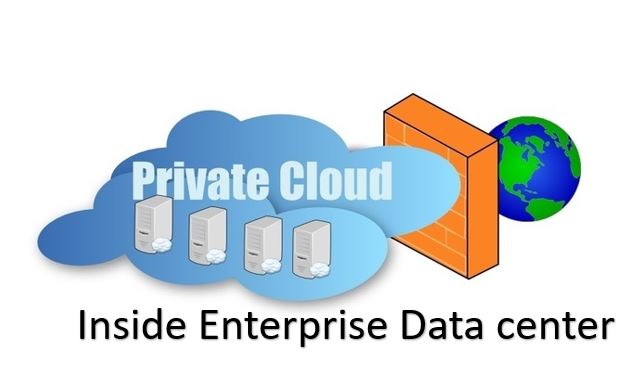Private Clouds are built for a single customer/company to provide the most effective control over data, security, and quality of service. The company has the infrastructure and controls how it deploys applications on that infrastructure. Private clouds can be deployed in the companies or enterprise own data centers behind their own firewalls for better security or they can be deployed in a secure hosting location. The thing to note is the that everything in private cloud is proprietary and belongs the company that deploying it. That’s why the private word is added to this type of cloud model.
Any Company’s own IT organization can built the private or can hire some cloud provider. In the case of cloud provider which is managed only model, the companies like Sun and IBM can install, configure, and operate infrastructure to support a private cloud within a corporate enterprise data center. Such kind of model gives the company a very high level of control over the use of cloud resources, while at the same time bringing the expertise needed to build and operate the environment.
The definition of cloud computing could be different from person to person but everyone has a certain consensus on many aspects of cloud computing, such as three-tier architecture (SaaS, PaaS, and IaaS). In addition to the three-tier architecture, everyone also believes that cloud can be divided into three types: Public cloud, Private cloud, and Hybrid cloud. However, here we only talk about the Private Cloud.

Advantages of Private Cloud:
1. Data security
In the Public cloud, for example, the Amazon, Google, Azure, and other services those stored the data of an individual or cooperate is somehow under the control of such cloud service providers; although they are safe and secure, especially in the management of data. But for enterprises, especially for large enterprises, business-related data is its lifeline and cannot be threatened in any way. So in the short run, large enterprises will not put their Mission-Critical running applications on the public cloud. Private clouds are very advantageous in this regard because they are generally built behind firewalls. But as compared to public cloud costly too.
2. SLA (Service-level agreement)
If the company uses the private cloud, the service that usually behind their own firewall not in some remote data center, only company’s employees can access the cloud-based application, the latency rate will be low and because of strict bandwidth monitoring; the SLA or quality of service provided by the private cloud to the company’s client or worker would be stable and seamless.
3. Make full use of existing hardware resources and software resources
Everyone knows that every company, especially large companies, has a lot of legacy applications, and most of the legacy is its core application. Although the public cloud technology is very advanced, it does not support the legacy application, because many are written in the static language, mainly Cobol, C, C++ and Java, and the existing public cloud supports these languages not very much in general. But private clouds are good in this regard, such as the cloudburst launched by IBM, through cloudburst, it is very convenient to build a Java-based private cloud. And some private cloud tools can use the company’s existing hardware resources to build the cloud, which will greatly reduce the cost of the enterprise.
4. Does not affect the existing IT management process
For large enterprises, the process is the core of its management. If there is no perfect process , the enterprise will become a loose sand. Not only are business-related processes very numerous, but there are also many processes in the IT department, such as those related to accounting, and other critical IT process. In this regard, the public cloud is very disadvantageous, because if you use the public cloud, it will have a lot of impact on the IT department process, such as data management and security regulations. In the private cloud, because it is generally inside the firewall, it has little impact on the IT department process .
The private cloud platform is divided into the following three parts:
Private cloud platform: The private cloud platform provides users with a variety of private cloud computing services, resources, and management systems.
Private cloud service: Private cloud services provide cloud services based on resources and computing power, including hardware virtualization, centralized management, and flexible resource scheduling.
Private cloud management platform: The private cloud management platform is responsible for the operation of various services of private cloud computing and centralized management of various resources.
Few open source tools for building Private cloud:
Eucalyptus: Elastic Utility Computing Architecture for Linking Your Programs To Useful Systems (Eucalyptus) is an open source software infrastructure for implementing flexible, functional cloud computing through compute clusters or workstation farms . Originally a research project at the University of California, Santa Barbara School of Computer Science, it has now been commercialized and developed into Eucalyptus Systems Inc. However, Eucalyptus is still maintained and developed as an open source project . Eucalyptus Systems is also building additional products based on the open source Eucalyptus; it also provides support services.
Other Top open source tools are OpenStack , hadoop, AppScale; these are few well-known names, however, there are other open source cloud computing software available online too, just search and you will get numbers of options.
Related Posts